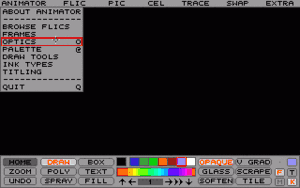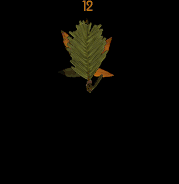Autodesk Animator
Autodesk Animator, also known as Ani Pro, PJ Paint, PJ, was a 2D computer animation and painting program in 1989 for PC with MS-DOS. The program was considered to be groundbreaking in the field of computer animation when it was initially released, and was very popular in the late 1980s and the early 1990s. [1]
 Screenshot of Autodesk Animator | |
| Developer(s) | Jim Kent, Yost Group, Autodesk |
|---|---|
| Initial release | 1989 |
| Final release | "Studio"
/ 1995 |
| Operating system | MS-DOS, Windows 95 |
| Platform | x86 |
| Type | Animation software |
| License | Proprietary (Animator Studio) Freeware / BSD license (Animator Pro) |
| Website | animatorpro |

Functionality
Animator gave the ability to do frame-by-frame animation (creating each frame as an individual picture, much like traditional cel animation). Animator Studio also had tweening features (transforming one shape into another by letting the computer draw each in-between shape onto a separate frame). Animator and Animator Pro supported FLI and FLC animation file formats, while Animator Studio also supported the AVI format. Animator was particular strong in Palette based editing, effects (like Color cycling) and animations a favored technology in the time of indexed CGA and VGA graphics modes.
Unlike other DOS software from that time, Animator was not restricted by the 640 kilobyte conventional memory limitation as it utilized a DOS extender by Phar Lap. Animator's combination of twenty tools multiplied by twenty inks, 3D 'optics,' unparalleled palette handling, custom fonts and many other useful features (such as its own internal scripting language POCO), put it many years ahead of better known animation tools of the time.
Development history
Animator originates back to its author's Jim Kent earlier program Cyber Paint for the Atari ST.[2] Jim Kent evolved in 1989 his software into Animator for Gary Yost's "Yost Group" for 80286 PCs with MS-DOS.[3][4] Animator was then licensed to Autodesk, who published the software as Autodesk Animator.
Releases
Animator was debuted at SIGGRAPH 1989,[5] featuring a VGA graphics mode of 320×200 pixels with 256 colors.
In July 1991, the successor Animator Pro was released, with the significant improvement of allowing almost any resolution and color depth. The software was sold for approx. $800, significantly more expensive than the previous version, addressing the professional audience.[4][6]
The 1995 released Animator Studio was a complete re-write for Windows 95, but was not anymore developed by the Yost Group.
Abandonment and legacy
Eventually development of the product ended and it became no longer supported by Autodesk. Filed on December 18, 1989, the trademark for "Autodesk Animator" expired on July 21, 1997.[7] DOSBox emulation allowed later to run Animator Pro on current hardware,[8] despite missing official support.
As Jim Kent kept copyrights to the 300,000 lines source code base of Animator Pro, he allowed to make it available to public under the open-source BSD license in 2009.[9][10] The original 256 color Animator version for DOS is also provided as Freeware download.[11] After some initial code review[12] porting to modern platforms was started on GitHub.[13] As of April 2014 most of the assembly language source code was ported to platform-agnostic C code and SDL was used as target back-end framework.[14]
Reception
Animator was considered to be groundbreaking in the field of computer animation when it was initially released, and was very popular in the late 1980s and the early 1990s. In the debut year 1989 Animator won PC Magazine's 6th Annual Technical Excellence Award for Graphics.[15]
Also, video game developers used the software for intros and other animated sequences in their games, for instance Formula One Grand Prix (1991, MicroProse), Cannon Fodder (1993, Virgin Interactive) and Jazz Jackrabbit 2[16] (1998, Epic Games).
Animator Studio attempted to do more than previous versions of the program, yet it had limited success. It also lost the ergonomic fluidity that the DOS versions had. Animator Pro, though, was by far the most useful, and was exceptionally fast compared with today's animation programs.
The program worked so well and had enough of an impact, that it convinced James Cameron that CGI could create a character in his next film, Terminator 2: Judgment Day; Autodesk did advertisement with this.[17]
There were also books written about Animator for instance "Inside Autodesk Animator: The Complete Guide to Animation on a PC" by New Riders Publishing in 1990.[18]
See also
- FLI/FLC Animator's file format
- Deluxe Paint
- List of 2D animation software
References
- Graphics - Winner: Autodesk Animator "Robert Bennett, Lewis Gartenberg, David Kalish, Jim Kent, Jack Powell, Gary Yost" on pcmag.com (1989)
- The Antic Cyber Graphics Software and the Pre-History of Autodesk 3D Studio and Discreet 3ds max. Asterius.com. Retrieved on 2013-04-22.
- jim_kent/Tesla on randelshofer.ch
- The First Pioneer in PC Animation: Autodesk Animator by Dr. Mussy "October – November, marks an interesting anniversary for animation: 21 years ago, animation became available for the PC platform." (November 8, 2010)
- Animation Software Companies and Individuals Archived 2016-12-19 at the Wayback Machine "At the 1989 SIGGRAPH in Boston, Autodesk unveiled a new PC based animation package called Autodesk Animator." by Wayne Carlson on Ohio State University
- PC Mag Aug. 1992
- "Autodesk Animator". United States Patent and Trademark Office. Retrieved 2017-02-17.
"Word Mark AUTODESK ANIMATOR [...] Serial Number 74011626, Filing Date December 18, 1989 [...] Live/Dead Indicator DEAD, Cancellation Date July 21, 1997"
- Wacom Tablet+Dosbox+Autodesk Animator Pro by ZenPsycho on vogons.org (2006-11-23)
- animator pro on GitHub "All source code (unless otherwise marked, or if better information becomes available) is ©1989-1994 Jim Kent and is available here under the BSD license"
- Breton Slivka (2009-05-08). "Autodesk Animator - UPDATE: New website, animatorpro.org , Source code now online".
he kept his rights to the source code, and now, he is granting me access to the source code, to make it available to you all! Well not so fast. He also asked me to get in touch with Gary Yost to ensure that he didn't object. [...] But I managed, and I got his support too! So now that all the relevant parties are up to speed with my idea let's go
- downloads on github.com
- porting-autodesk-animator-pro-to-be-cross-platform on Stackoverflow
- Animator-Pro on github.com
- PJ: remove add_check_tflx_toram and rem_check_tflx_toram. by wangds on github.com/AnimatorPro (23 April 2014)
- Graphics - Winner: Autodesk Animator "Robert Bennett, Lewis Gartenberg, David Kalish, Jim Kent, Jack Powell, Gary Yost" on pcmag.com (1989)
- About - Creation of Jazz Jackrabbit
- Advertisement Autodesk Animator Pro on PC Magazine (May 26, 1992)
- Inside Autodesk Animator: The Complete Guide to Animation on a PC. New Riders Publishing. 1990. ISBN 9780934035767.
External links
| Wikimedia Commons has media related to Autodesk Animator. |
- Animator-Pro on GitHub
- Animator (1989) Freeware download via GitHub
- Gallery with examples of Animator created animations